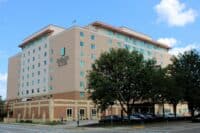

There is a huge risk-reward factor in emerging pharmaceutical and biotech companies that happen to have all their eggs in just one basket. That’s the case of resTORbio Inc. (NASDAQ: TORC), and it’s the risk that came to haunt the shareholders this time around.
resTORbio announced that its Phase 3 PROTECTOR 1 trial of RTB101 failed to meet its primary endpoint in a study aimed to treat clinically symptomatic respiratory illness. The company also announced that it is halting further development of clinically symptomatic respiratory illness indication, but it will continue the studies and development of RTB101 in other aging-related diseases (including Parkinson’s disease).
While the company announced that it is well funded with $117.3 million in cash and cash equivalents as of the end of September, and even considering it has no serious current or long-term liabilities, investors have every right to be spooked here. RTB101 is the company’s lead candidate, and its study targeting clinically symptomatic respiratory illness was the one study that was the farthest along in its pipeline.
As far as why investors would worry that resTORbio is just the next biotech implosion with a limited future, the company’s pipeline page on its website even says:
Our lead program selectively inhibits the activity of a protein complex called target of rapamycin complex 1, or TORC1, an evolutionarily conserved pathway that contributes to the decline in function of multiple aging organ systems. Our lead product candidate is a TORC1 inhibitor called RTB101.
We are developing RTB101 alone and in combination with other TORC1 inhibitors for multiple aging-related diseases. In addition to developing our TORC1 product candidates, we are building a pipeline of products targeting multiple mechanisms underlying the biology of aging.
While there are other indications in the pipeline for RTB101 — Parkinson’s in ongoing Phase 1b and 2a and Phase 1 studies for urinary tract disease and heart failure with preserved ejection fraction — investors and would-be patients tend to be skeptical that a secondary focus will be successful after a primary target fails. That logic does not always prove to be true, but that’s how it works when Wall Street meets Main Street.
Another issue to consider is that companies can claim all the cash they want heading into bad news. The class-action suits, investigations and reworking of other efforts will often consume far more cash than a company has. This company has no revenues to speak of, and its retained earnings (accumulated losses against future income) were already up to −$125.24 million as of September 30, 2019. That is since resTORbio was founded in 2016, and it only came public in early 2018 (at $15 per share).
Shares of resTORbio were last seen trading down 84% at $1.28, after having previously closed at $7.95 and against a 52-week high of $14.05. resTORbio now has a mere $44 million market cap. Its trading volume of almost 9 million shares by 11:10 am represented nearly 50 times the average trading day’s entire volume.
Take This Retirement Quiz To Get Matched With An Advisor Now (Sponsored)
Are you ready for retirement? Planning for retirement can be overwhelming, that’s why it could be a good idea to speak to a fiduciary financial advisor about your goals today.
Start by taking this retirement quiz right here from SmartAsset that will match you with up to 3 financial advisors that serve your area and beyond in 5 minutes. Smart Asset is now matching over 50,000 people a month.
Click here now to get started.
Thank you for reading! Have some feedback for us?
Contact the 24/7 Wall St. editorial team.



